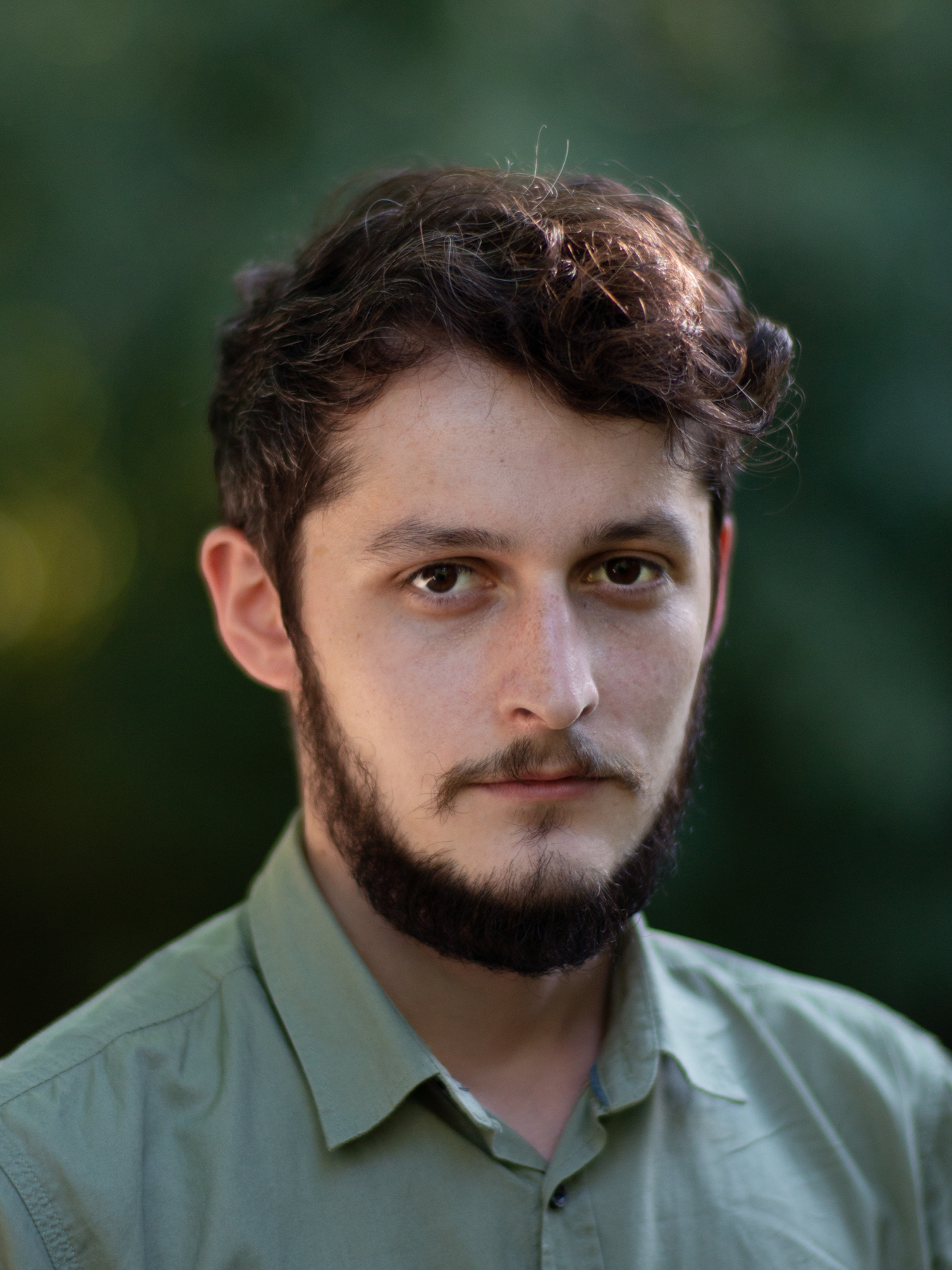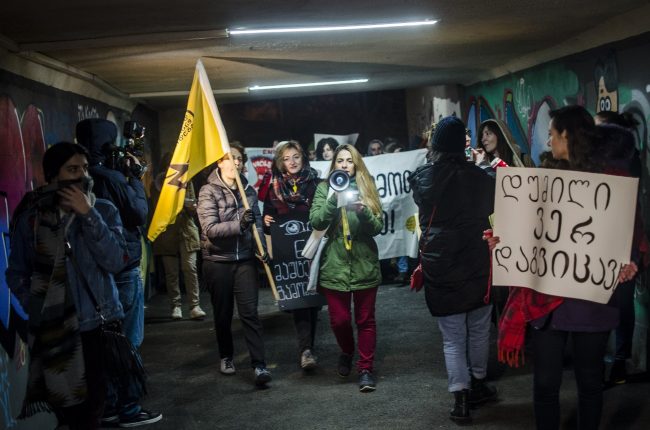
 Despite a rise in the awareness of women’s rights in Georgia, feminist activists have found themselves up against a deeply-rooted culture that hinders further progress. Early marriages, a lack of recognition of the need for more female decision-makers, and impassivity towards women’s issues in the male-dominated parliament create a compounding, socially-driven force that stands on the way of gender equality.
Despite a rise in the awareness of women’s rights in Georgia, feminist activists have found themselves up against a deeply-rooted culture that hinders further progress. Early marriages, a lack of recognition of the need for more female decision-makers, and impassivity towards women’s issues in the male-dominated parliament create a compounding, socially-driven force that stands on the way of gender equality.
Natia was only 17 when she became a bride. A 25-year-old man kidnapped her twice, and the second time, she agreed to marry him.
‘It’s hard to tell whether it was consensual. At the time, I thought marriage was mandatory for women, and that I had no other choice than to accept it. I had already been labelled “a daring, bad girl” [by my community]. So after he kidnapped me the second time, going back didn’t seem like an option’, 32-year-old feminist Natia Kharatishvili tells OC Media.
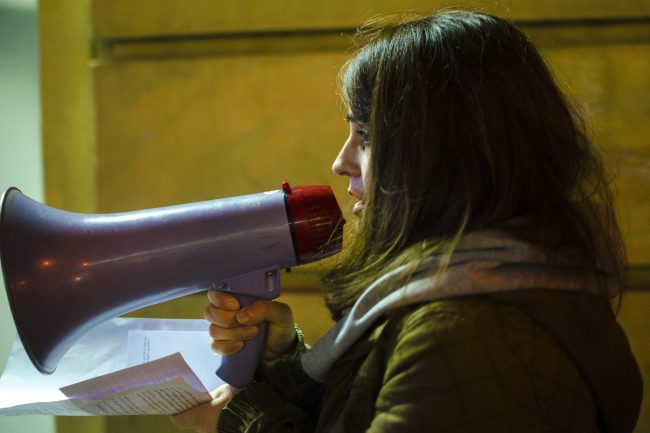
The marriage didn’t last long. Her husband quickly became inattentive and started spending most of his time out with friends; meanwhile she was encouraged to stay home and do domestic chores. He didn’t support her education. He was controlling. The last straw for Natia was when he suggested that she drop out of university. Three months into the marriage, she left him.
‘When I returned to my parents’ house, they had become more controlling and kept telling me to act “decently”. I was asked to be obedient, avoid men, and abstain from sexual behaviour’, Natia recalls.
Had she not left, Natia thinks that she’d probably be a mother of several children today, without any higher education or economic independence.
‘The three months I spent in that house did a lot of damage to my well-being. Had I spent years there, I can only imagine where I’d be now’, she says.
Before 2015, it was legal to marry at 16 in Georgia with parental approval. The law banning the registration of marriages for anyone under the age of 18, regardless of parental consent, was enacted in January 2017.
Nevertheless, child marriages have not ended — informal marriages and engagements have taken their place. In 2015, 611 marriages were registered that involved minors. In the same year, 408 students between 13–17 dropped out of school to be married. A 2017 survey conducted by the Public Defender’s Office showed that over a six-month period, the Public Service Development Agency registered 382 underage mothers and 14 underage fathers.
Baia Pataraia from the Women’s Movement, a women’s rights group, believes that schools must play a greater role in preventing early marriages. ‘Teachers do not report it’, she says, adding that their involvement would help decrease the number of child marriages. She also says that culture plays an important role here, because people just don’t see child marriages as a problem, and that men are not afraid of the law, because they know they’ll get away with a plea deal.
‘If school administrators become aware that children are going to get married, they are required to intervene, involve social workers, and inform the police. But currently, all of this is only on paper’, she says.
When girls get married as minors, they are deprived of professional development, which leads to low incomes and financial dependency. According to national statistics, 42% of women were economically inactive in 2015, as compared to 22% of men. The statistics also showed that in 2016, working women earned ₾731 ($300) per month on average, while men earned ₾1,116 ($450). Financial dependence is also a critical reason that women may be trapped in abusive marriages.
Pataraia says that many in Georgia find it hard to see just how large the correlation is between strengthening women economically and strengthening them politically. Without financial independence, she says it is impossible for women to achieve enough power to advocate for themselves.
Women in parliament
When it comes to decision-making, however, there’s a markedly low representation of women in politics. Among 193 countries worldwide, Georgia ranks 124th in the proportion of women in parliament — only 16% of MPs are women. In March, the Georgian Parliament rejected a bill that would have guaranteed at least 25% female representation.
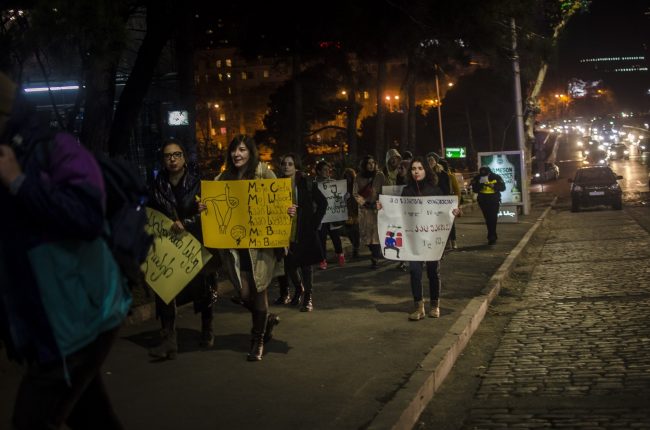
‘Men are not motivated to make decisions that involve giving up their seats to women, and they haven’t offered any alternatives for increasing women’s political participation’, Pataraia tells OC Media.
Recent polls by the National Democratic Institute show that 49% of the Georgian population supports the initiative to establish a mandatory quota system, yet only 44% believe that the best distribution of parliamentary seats would be 50/50 for both genders.
Former MP Tamar Kordzaia, from the Republican Party, tells OC Media she could feel the gender discrimination as soon as she registered as a candidate.
‘When I went to talk with the electorate, men wouldn’t even come close to me. It’s mainly women who talk to you, and it takes a lot of effort to make the men approach you. There is no such barrier for male candidates’, Kordzaia tells OC Media.
She says it’s a result of the nation’s culture and traditions, but male candidates do not want to admit that it’s a real problem. Kordzaia adds that the discrimination against women continues long past the elections, throughout their time in parliament, where women struggle to get their male colleagues to listen.
At the local level, female representation is even worse. Women constituted only 13.46% of elected politicians in the country after the 2017 elections. Among the 64 elected mayors in the country, there is only one woman. In 22 of 64 city councils, not a single woman was elected as a majoritarian candidate.
‘The 2017 local government elections proved once again that it is impossible to achieve growth in women’s political participation without some kind of intervention’, concluded a local rights group, the Georgia’s Young Lawyers’ Association. Achieving equality will rely heavily on government assistance, but without women in positions of power to drive that progress, it seems to be at a standstill.
A man’s legal agenda
Georgia’s male-dominated legislature has failed to effectively protect women from violence; a recent study by UN Women found that one in seven Georgian women has experienced domestic violence.
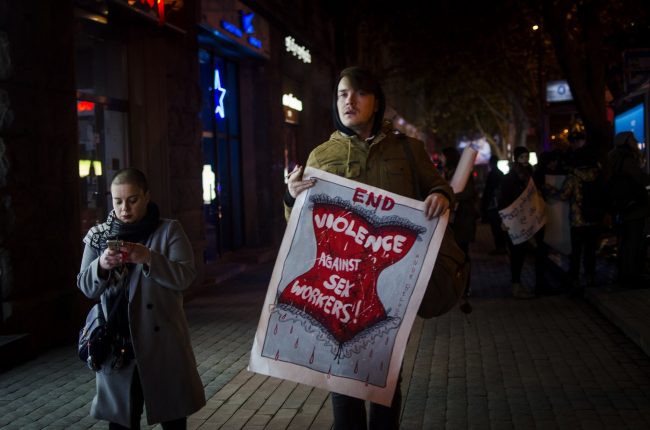
In 2017, Georgia ratified the Istanbul Convention on preventing and combating violence against women and domestic violence. The Public Defender’s 2017 report accordingly stated that ‘domestic violence remains an important challenge’ in the country.
At present, 22% of women and 31% of men believe that, in certain circumstances, it is justified for a man to beat his wife. Furthermore, 23% of women and 42% of men believe that women must obey their husbands, even when they don’t agree with them.
At these levels of prevalence and acceptance, it’s inevitable that domestic violence will sometimes result in femicide. Twenty-two women were killed in 2017. After a number of feminist rallies urging Parliament to take protective measures and adopt a bill against femicide, expectations in the country grew that enough MPs would support the legislation. The initiative was voted down by Parliament twice, however, in 2016 and in 2017. In its only action on the matter, the Interior Ministry recently said that it had drafted its own bill, which treats gender-based murder as an aggravated circumstance.
Even sexual harassment, one of the most widespread forms of discrimination against women, is largely unchecked by the law. In Georgia, one in five women say they have experienced some form of sexual harassment, according to a recent poll by the UN Women. Nine per cent say they fell victim to sexual violence as children.
Despite the extent of the problem, there are no legal means of protecting women against it. According to a January poll by the National Democratic Institute, 77% of the population supports a bill against sexual harassment. In late 2017, the Women’s Movement addressed Parliament with a petition to amend the administrative offences code and the labour code to ensure that women are protected against undesirable encounters in public and and in the workplace. Although it received support from the Human Rights Committee, no legal developments have been made yet.
‘A culture without problems’
Eka Imerlishvili, from the Independent Group of Feminists, was not surprised to learn that not everyone is in favour of making sexual harassment punishable.
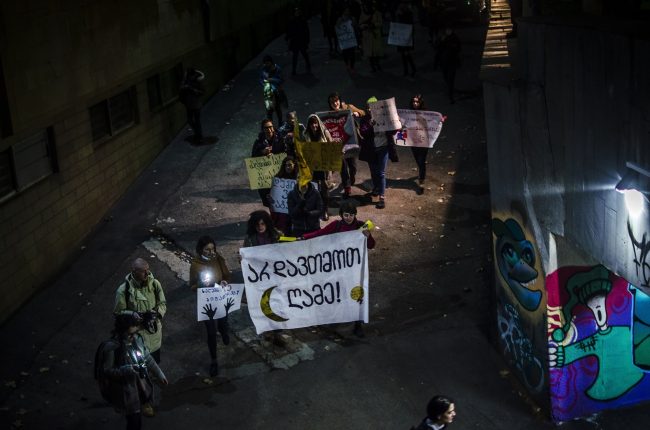
‘Basically, we’re fighting against a culture that thinks we don’t have problems. This is very symptomatic of a masculine culture, a patriarchal system that doesn’t want to admit it has issues’, Imerlishvili tells OC Media.
Because there are too few women in politics to drive meaningful change, feminist groups generally try to pick up the burden. She says, however, that when feminists bring up issues like sexual harassment, society fires back violently, calling them ‘ugly women who nobody wants to have a relationship with’. She says there still is a fear of the word ‘feminism’, which is widely associated with radicalism.
‘Feminism has been perceived as an “imported activity”, but the fear is slowly disappearing’, says gender specialist Tamta Melashvili, ‘as feminists are succeeding to convince people that Georgian feminism has Georgian roots’.
Nevertheless, Imerlishvili knows that the cultural obstacles to progress are tall and wide. ‘I think we haven’t won a single war yet. We’re fighting on many fronts simultaneously: economic and political rights, child marriages, political participation. We have to deal with all of this together’.




 13 July 2018
13 July 2018
